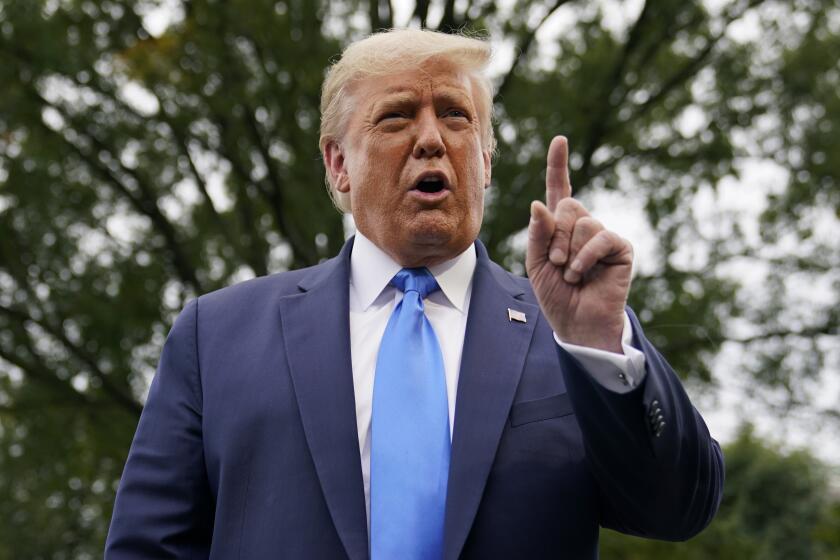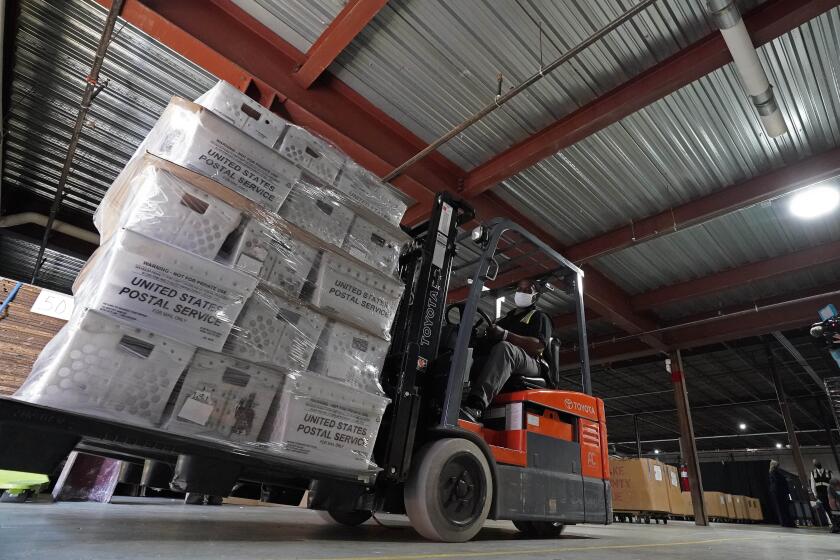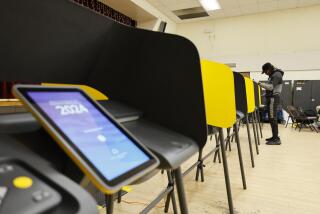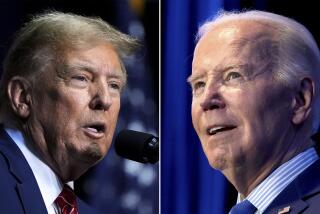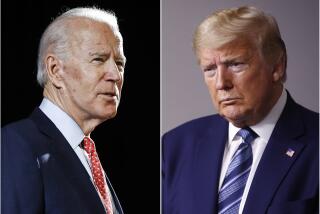‘It’s going to be like war.’ Voters eye 2020 election outcome with fear and loathing
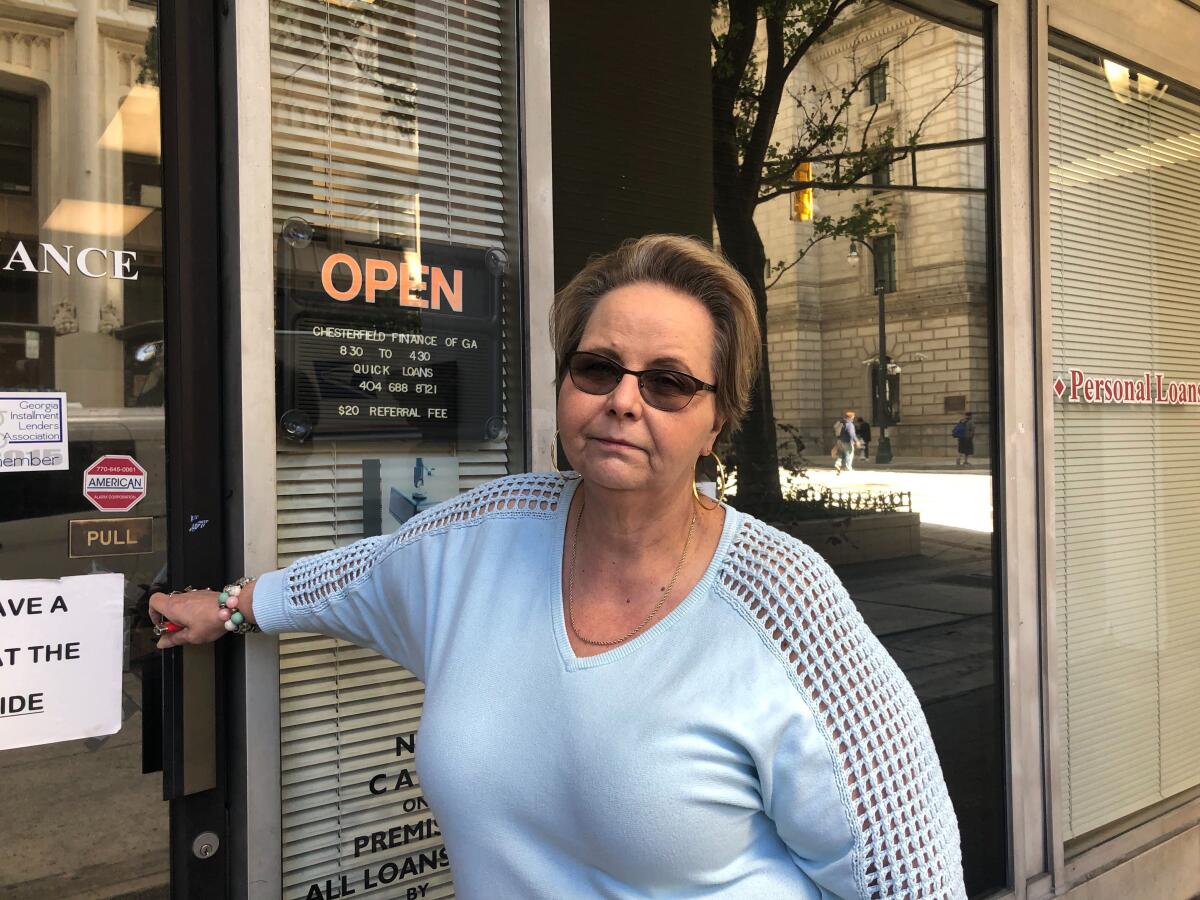
When Jim Jackson looks ahead to November, he cringes at what he sees: a defeated President Trump refusing to leave the White House and his supporters waging war to keep him there.
“The militias and the white supremacists ... they’re going to put out the call to arms,” said Jackson, 73, who lives in the conservative-leaning suburbs of Milwaukee and voted Republican for 52 years, but not for Trump. “That’s my worst nightmare.”
Jeanine Davis shares his concern, though for different reasons.
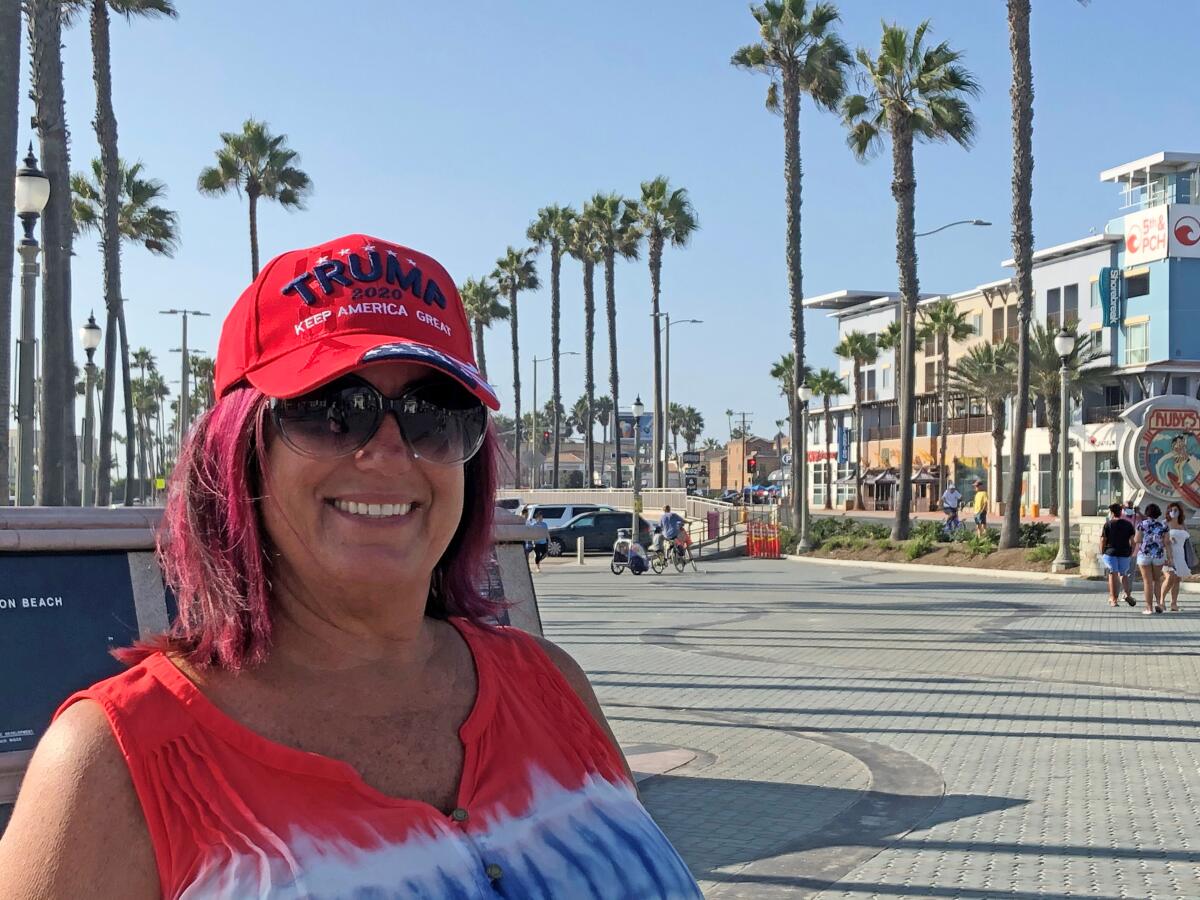
Seated near the Huntington Beach Pier, wearing a red “Keep America Great” hat, the Trump supporter suggested Democrats will do whatever it takes to elect Joe Biden, and riot if they fail. “It’s going to be like war amongst citizens,” said Davis, an executive recruiter in her 50s.
Candidates often say a presidential contest is the most important ever, telling voters to act as though their life depended on it and the country’s future was at stake. Dozens of conversations with voters across the nation — from the West Coast to the Upper Midwest to the East — suggest that, this time, many people really believe it.
Punished by pandemic, buckled by economic hardship and riven by relentless partisanship, America is facing an election unlike any in modern times, a vote shadowed by menace and fringed with paranoia — much of it fed by the occupant of the Oval Office, who incessantly acts to undermine confidence in the result.
“He’s essentially trying to pull off a coup,” said Frank Dudek, a 70-year-old retiree, after casting his ballot at an early vote center in Arlington, Va., just outside the nation’s capital.
Trump’s refusal to say that he’d peacefully transfer power may just be bluster. But there are steps he could take, and Democrats are on the alert.
Some voters worry about frayed family ties. Others see the whole country unraveling. A significant number consider threats and violence a reasonable way to solve partisan differences.
“You have all these things — the pandemic, the protests, the counterprotests, the Black vs. white, the right against the left,” said Allison Trammell, 60, an Atlanta social worker who supports Biden. “It’s almost like everything is coming up at the same time and there’s no equilibrium. There’s no middle ground.”
What is more, many are acting on their fears, anticipating all manner of chaos, up to and including armed insurrection. They’re flooding gun stores and shooting ranges, stockpiling ammunition and provisioning for a postelection dystopia.
“We’re hoping for the best. We’re preparing for the worst.”
— Ashley Avis, 36-year-old nurse and Trump supporter in Pinellas Pines, Fla.
Ashley Avis, a 36-year-old nurse, was recently out with her father and 2-year-old son in Pinellas Park, Fla., buying plywood to board up their windows in case of civil unrest. She also plans to secure an alternative water supply, lest the public works around Tampa Bay are taken out of commission.
“We’re hoping for the best,” said the Trump supporter. “We’re preparing for the worst.”
Across the country, in a working-class neighborhood on Las Vegas’ east side, Michael Martinez said he, too, planned to lay in extra food and water “just in case there’s a disruption in our food delivery systems and whatnot.”
“I wouldn’t put it past some people” if Trump loses, said Martinez, 69, a retired union carpenter and Biden supporter. “That’s the way they’ll try to disrupt the economy, try to disrupt the way we live now.”
Not everyone sees election day as the dawn of a coming apocalypse.

Dave Gorrasi, who owns Blue Hook Aquatics just outside Cincinnati, says he believes the talk of widespread upheaval is a device both sides are using to gin up support.
“I think there is going to be less trouble once the election’s done because then we can go back to normalcy,” said the 41-year-old political independent, who is still undecided.
Jackie Dodd, a financial loan officer from Mableton, Ga., suggested people always get agitated around election time and doesn’t see the political climate getting any worse after Nov. 3.
“We got violence now,” the 60-year-old Trump supporter said during a cigarette break outside her Atlanta office. She pointed toward the shuttered Centennial Olympic Park, where mostly peaceful protesters converged over the summer after George Floyd was killed by Minneapolis police.
Months after the CNN headquarters was vandalized and police cruisers set ablaze, some downtown storefronts are still boarded up out of concern.
“Look at what happened four years ago,” Dodd said. “It’s not different. Any election, someone is going to be disagreeing.”
As starkly as the country is divided, a poll for the Democracy Fund Voter Study Group, a collection of experts across the political spectrum, found the overwhelming majority of Americans believe there is no place for violence in the country’s political system.
(The quietude of recent decades is a relatively recent phenomenon. Violence around elections was not uncommon in the 19th century, and lynchings, to keep Black voters away from the polls, continued well into the 20th century, Bowdoin College scholar Jeffrey Selinger points out.)
Still, 16% of those surveyed in late 2019 said the use of violence to advance political goals would be “a little” justified. The number, essentially equal among Democrats and Republicans, grew to 21% when respondents were asked to consider the possibility of losing the 2020 election. That amounts to millions of Americans who would condone the use of force, even if they don’t personally act out.
Given the country’s hothouse atmosphere, some who renounce violence worry about those who won’t.
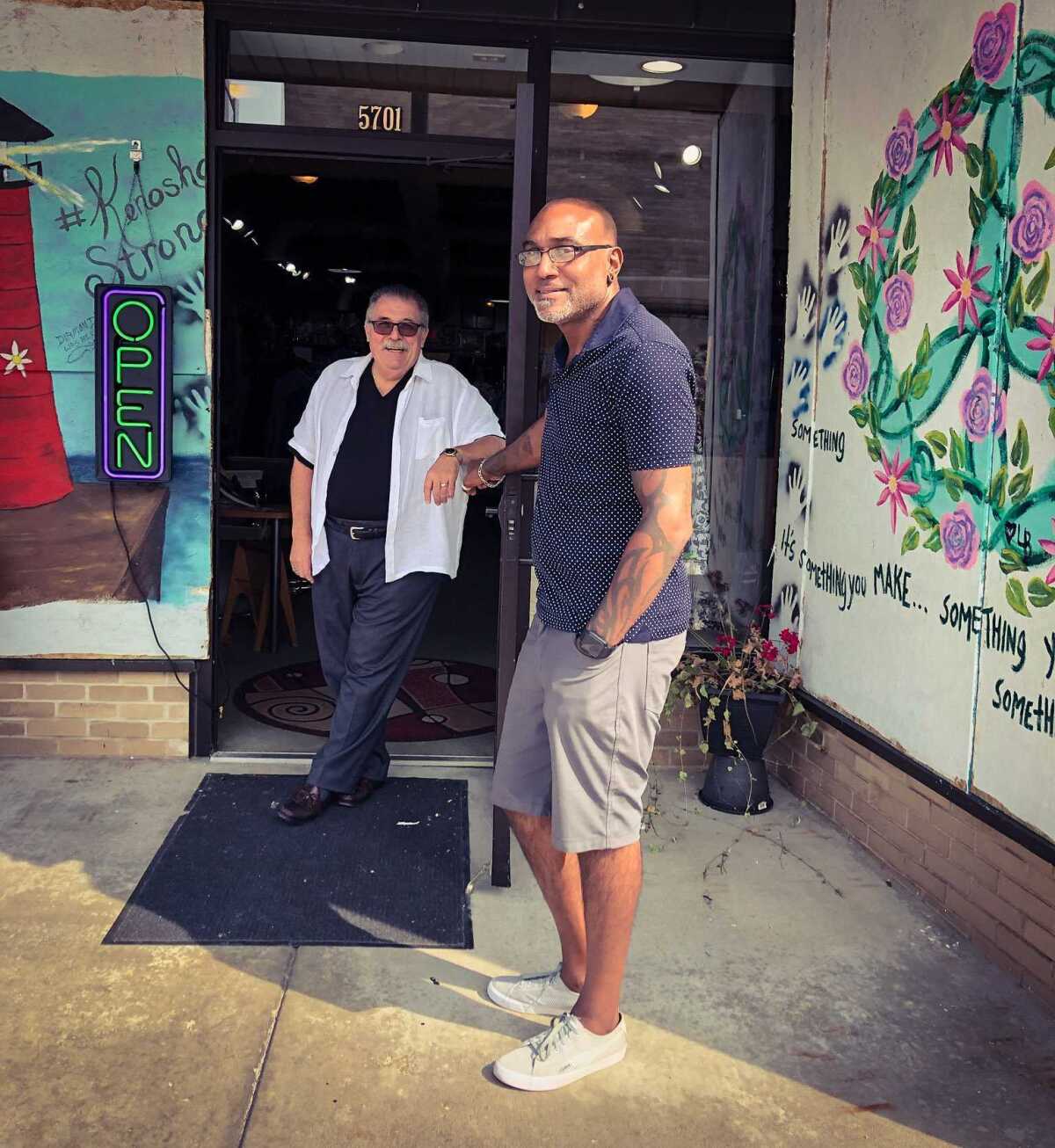
“If Trump gets reelected or if Biden wins, who can say what will happen?” said Shad DeLacy, 43, a political independent who runs a menswear boutique on the main business strip in Kenosha, Wis. He gestured at buildings across the street, boarded up as a precaution after days of unrest following the August shooting of Jacob Blake, a Black man, by a white police officer.
“This surprised me. This isn’t who we are in Kenosha,” DeLacy said. “So I can’t even fathom how it will be if the wrong person gets elected. I can’t put my faith in humanity right now.”
He has no intention of voting in November.
Many of those who do plan to vote worry about the integrity of the election and the fairness of the process, undercutting their faith in the outcome. Partisans on both sides found cause to question the integrity of the other.
Mary Copps, 74, a retired occupational therapist who plans to vote for Trump, said she has received several applications for absentee ballots at her home in Mequon, a predominantly white suburb north of Milwaukee. Wisconsin verifies that ballots are sent only to registered voters, but still Copps was dubious, echoing the president’s attacks on the legitimacy of voting by mail.
“I suppose I could fill them out with ... who knows,” she said. “Multiple names?”
Sarah McCabe, who is in her 50s, has long believed presidential elections were unfair because they were decided by the electoral college rather than the popular vote, which gives disproportionate weight to more conservative, less populated states. But the Biden supporter is particularly worried about this election and the COVID-19 pandemic that has many Democrats preferring to vote absentee.
“I am concerned about the slowing down of the mail and ... the potential of challenging absentee ballots,” McCabe said as she waited outside a hair salon in downtown Holland, Mich., while her daughter was getting a cut. “I’m especially astounded that we have to be concerned about our post office. They took our mail-sorting machines in Grand Rapids. Of course this is being done to benefit the president.”
These states will probably decide if Joe Biden or President Trump wins the election. And their absentee ballot laws could determine when we find out.
Some are going beyond merely fretting.
In a new research paper, UC Riverside economists Bree Lang and Matthew Lang found a record 3.9 million firearm background checks were completed after protests swept the country following the police killing of Floyd. There was no statistical difference in the surge between Republican- and Democratic-leaning states.
A separate trade group study found the highest increase in gun sales was among Black Americans, which rose nearly 60% during the first six months of the year.
Aldrin Eusebio, 30, a gun owner waiting in line outside Turner’s Outdoorsman in Pasadena, said he wanted “to protect myself and my family with the rioting and everything that’s been going on. They are already saying if Trump wins, they’re not going to accept it.”
“It’s been 3½ years of dealing with this fake ‘Russia collusion’ story and 3½ years of fake news,” said the medical technician who plans to vote for Trump’s reelection in November. “So I am just worried about what will happen if he wins again. They’ll come up with some ... excuse” to try to eject him from the White House, he said.
Even some with no fear of violence worry how — and whether — the country will come together after being so fiercely wrenched apart. In certain instances, it’s personal.
McCabe, a clerical worker at a physician’s office, comes from what she described as “a blended family.” One sister, like her, supports Biden. Their other sister backs Trump.
McCabe said she’s dreading Thanksgiving.
Barabak reported from Las Vegas and Jarvie from Atlanta. Times staff writers Tyrone Beason in Kenosha, Wis., Brian Contreras in Arlington, Va., Michael Finnegan in Pinellas Park, Fla., Melissa Gomez in Huntington Beach, Arit John in Santa Clarita, Melanie Mason in Waukesha, Wis., Seema Mehta in Holland, Mich., and James Rainey in Cincinnati contributed to this report.
More to Read
Get the L.A. Times Politics newsletter
Deeply reported insights into legislation, politics and policy from Sacramento, Washington and beyond. In your inbox three times per week.
You may occasionally receive promotional content from the Los Angeles Times.
